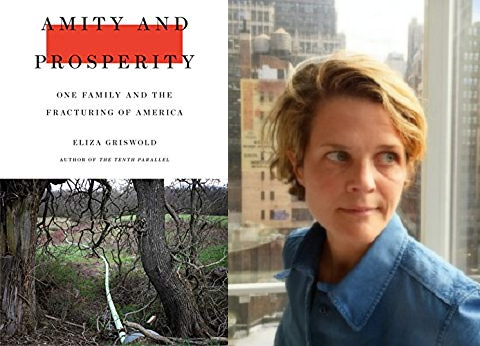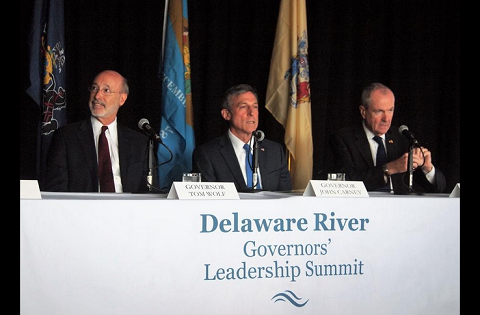
“Amity and Prosperity”, by Eliza Griswold, Wins Pulitzer Prize
April 17, 2019
Environmental Leaders Applaud Delaware River Governors
May 20, 2019By Kyle Bagenstose, Burlington County Times, May 16, 2019
During a meeting with Gov. Phil Murphy, Pennsylvania Gov. Tom Wolf and Delaware Gov. John Carney said they now support a full ban on hydraulic fracturing in the watershed, as well as a ban on any water transfers associated with drilling operations, a stance Murphy previously said he also supports.
Pennsylvania Gov. Tom Wolf and Delaware Gov. John Carney on Thursday joined Gov. Phil Murphy in support of a full ban on fracking activities in the Delaware River basin, a position long sought by environmental activists in the region.
Wolf and Carney, both Democrats, previously supported a ban on using hydraulic fracturing — a drilling technique being used to extract large bounties of natural gas in Pennsylvania — in the basin. Together with Murphy, the governors represent three of five voting members of the Delaware River Basin Commission, an interstate regulatory agency that also includes the governor of New York, along with a representative of the federal government.
In 2017, Wolf and Carney joined New York Gov. Andrew Cuomo in pushing through a 3-1-1 vote on draft DRBC regulations that would ban fracking activities in the basin, which stretches 13,539 miles across the four states.
But the draft regulations did not ban the importation of wastewater from drilling operations outside the basin, nor the withdrawal of raw water from the basin to be used for drilling operations elsewhere. Officials with the DRBC have said the draft regulations would actually strengthen importation and exportation protections from a current lack of regulation, but environmental groups have loudly demanded a full ban.
Murphy announced earlier this year he supports a full ban, joining Cuomo, whose state has already entirely banned fracking. On Thursday, Murphy joined Wolf and Carney in Philadelphia to sign an aspirational “proclamation” that the three states would work together to improve the health of the Delaware River.
Murphy used his remarks to reiterate his commitment for a full ban.
“What we are doing to both ban fracking in the Delaware River watershed, as well as efforts to further ban the waters and materials that underpin that is something we should all take pride in,” Murphy said to a smattering of applause. “And that’s still a work in progress.”
Wolf had not previously voiced his support for such a measure. Asked during a press meeting if he supported Murphy’s position on the importation and exportation issue, Wolf said he did.
“I’m fine with it,” Wolf said. “I thought we had actually had dealt with that, so apparently we’re still working through some details.”
Carney also answered affirmatively.
“We’re in the same place,” Carney said.
Both Wolf and Carney were asked a second time to confirm they supported a full ban, including water transfers, and neither demurred.
Asked for confirmation of Wolf’s position, Lyndsay Kensinger, his deputy press secretary, said Wolf “continues to believe that this should be a regional decision but that there is clearly support, as evidenced at the Delaware River Governors’ Leadership Summit today, for going further with the proposed regulations to protect the water quality of the Delaware River.”
A spokesman for Carney’s office took no issue with this news organization’s interpretation of his position.
The DRBC has not addressed the draft regulations in any official capacity for more than a year. After the September 2017 vote by the commission members, which directed staff to move forward with draft regulations, staff began collecting public comment. Those efforts included a packed-house hearing in South Philadelphia in January 2018, which became the last public sign of progress on the issue.
Presumably, commission staff have since worked to consider the comments and potentially adjust the draft regulations. Carney said Thursday the commission is “still taking public comments and that kind of thing.”
However, the DRBC’s website says public comment closed in March 2018, and commission staff did not immediately respond to questions sent Thursday afternoon about the status of the draft regulations.
The northern half of Burlington County falls within the river’s basin. However, experts say there is little to no proven gas deposits in the area worth pursuing, and that a ban on drilling would primarily affect Wayne and Pike counties in the northeast part of Pennsylvania.
Gerald Kauffman, director of the University of Delaware’s Delaware Water Resources Center, authored a study that found about 9 percent of the highly productive Marcellus Shale region lies within the basin, potentially holding as much as $435 million in annual gas production.
Industry groups have previously blasted any bans. David Spigelmyer, president of the Marcellus Shale Coalition, said in 2017 that the potential ban on drilling in the basis was part of an “activist agenda.”
“Regulatory overreach and a fundamentally broken permitting process costs local jobs and investment without helping our environment in any way,” he said.
Wolf, Carney and Murphy were in Philadelphia on Thursday to more generally renew their commitment to protecting the Delaware River. The trio signed a proclamation that recognized “the advantage of working together to make the Delaware River Basin the national model for sustainable economic development, drinkable clean water, healthy fish and wildlife populations, outdoor recreation, and nature-based climate resilience.”
They also participated in a forum with Collin O’Mara, president of the National Wildlife Federation. Each governor said they believed working together would bring increased attention to the watershed, and bolster efforts to win more federal funding than the $5 million Congress currently provides annually.
Murphy said he believes the partnership is more than just window dressing, and that their respective staffs were all working behind the scenes on policies and solutions to better improve the basin.
Asked if there was a political strategy to get more federal money, Wolf joked it was to do “a lot of whining.” More seriously, the governors said they would work to get their congressional delegations to fight in unison for more funding.
DCS has been fighting for a ban in the Basin since 2008. Now that 3 Basin governors support a full ban, we are almost there. You can help make a full ban a reality. If you live in New Jersey, Delaware or Pennsylvania, contact your governor and thank them for their support of a full ban. If you live in New York, contact Governor Cuomo and urge him to support a full ban. Contact information for the Basin governors can be found here.



